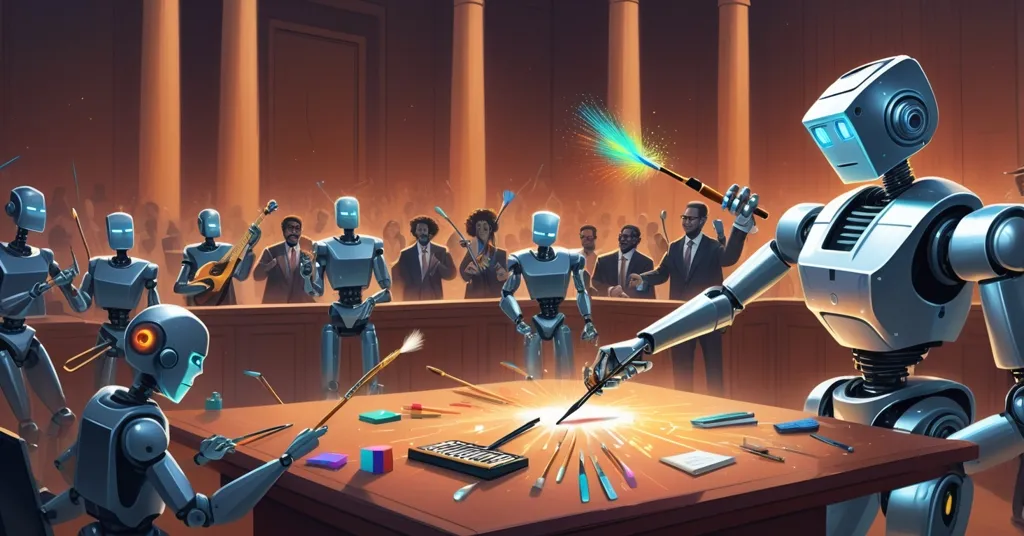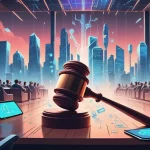UK Data Bill Stalled: AI Copyright Battle Threatens Creativity and Innovation

UK Data Bill Hits a Wall: AI Copyright Clash Pits Innovation Against Creators
Picture this: your life’s work—every song, painting, or story you’ve poured your soul into—sucked up by an AI algorithm without a penny or a nod in return. That’s the fiery debate engulfing the UK Data Bill, a piece of legislation meant to govern how artificial intelligence uses copyrighted material for training. As lawmakers, tech titans, and a £124 billion creative industry lock horns, the bill remains stalled, caught in a tug-of-war between fueling innovation and protecting the very heart of human creativity.
- UK Data Bill stalled over AI use of copyrighted content for training models.
- Government pushes opt-out rule for creators; opponents demand transparency and fair pay.
- Artists like Sir Elton John call it theft, risking a £124 billion industry, while tech warns of stifled innovation.
What’s the UK Data Bill, and Why the Uproar?
The UK Data Bill is a proposed law aiming to set the rules for how AI systems can use copyrighted material—think songs, books, artwork, or films—to train their algorithms. For the uninitiated, AI training is like teaching a machine to think by feeding it a massive library of information. The machine learns patterns, whether it’s how to mimic a musician’s style or replicate a painter’s brushstrokes, by analyzing thousands, if not millions, of examples. The government’s plan? Allow AI developers to access this creative content by default unless copyright owners actively say “no”—a so-called opt-out system. Sounds simple, but it’s ignited a firestorm, with significant opposition in the House of Lords.
On one side, the UK government and tech advocates see this as a practical boost to AI development, a sector that could pump billions into the economy. On the other, a coalition of artists, industry leaders, and 300 members of the House of Lords—the upper chamber of UK parliament—call it a betrayal. They demand AI firms disclose exactly what copyrighted works they’re using and ensure fair compensation through licensing deals. Without these safeguards, they argue, it’s open season on creators’ livelihoods, especially for the 2.4 million working in a creative sector that’s a powerhouse of local communities and national exports.
The legislative process itself adds to the chaos. In the UK, bills bounce between the House of Commons (elected representatives) and the House of Lords (appointed peers) until both agree on the text—a process dubbed “ping-pong.” Right now, the bill is stuck in this loop, with the Commons rejecting a Lords amendment to protect creators, and a crucial review looming in the upper house come early June. Every delay ratchets up the tension, as the outcome could reshape tech policy and creative rights for decades.
Artists’ Fury: A Middle Finger to a £124 Billion Industry?
The creative industry isn’t just a niche; it’s a juggernaut worth £124 billion to the UK economy, growing 1.5 times faster than the national average and fueling 14% of service exports. From indie musicians in Bristol to graphic designers in Manchester, it employs millions, often in small businesses or freelance gigs that glue local economies together. The fear is palpable: if AI can hoover up their work without payment or consent, what’s left for the human creators behind it? This concern is echoed across creative communities facing AI data scraping challenges.
Baroness Beeban Kidron, a former film director and crossbench peer in the House of Lords, has led the charge against the bill’s current form. Her words cut like a knife:
Ministers would be knowingly throwing UK designers, artists, authors, musicians, media and nascent AI companies under the bus.
She accuses the government of enabling “state-sanctioned theft” from an industry that’s not just a cash cow but a cultural bedrock. Her amendment, backed by a 272-to-125 vote in the Lords, sought mandatory transparency and licensing but was shot down by the Commons. Still, her fight—and that of her allies—presses on.
High-profile artists have thrown their weight behind the cause, turning the debate into a public spectacle. Sir Elton John didn’t hold back, slamming the government for being on course to “rob young people of their legacy and their income,” branding them “absolute losers.” Sir Paul McCartney and Dua Lipa have echoed similar outrage, framing the bill as a direct threat to future generations of creators. Even beyond the UK, voices like the founder of Studio Ghibli, the iconic Japanese animation studio, have decried AI’s role in art as “an insult to life itself”—a sentiment sharpened by OpenAI’s tools recently churning out viral Ghibli-style images without permission.
Tech’s Defense: Don’t Strangle the Future of AI
Flip the coin, and you’ve got the tech industry and government allies making their case with equal fervor. Their argument hinges on the sheer potential of AI—think breakthroughs in healthcare diagnostics, educational tools, or even climate modeling—that rely on vast, diverse datasets to function. If every copyright holder had to explicitly greenlight their work for AI use, development could grind to a halt, costing the UK its edge against global competitors like the US or China.
Sir Nick Clegg, ex-president of global affairs at Meta, has been a loud voice for this side. His warning is blunt, as highlighted in his statements on AI innovation:
Asking permission from all copyright holders will ‘kill the AI industry.’
He’s not wrong to point out the logistical nightmare. Imagine an AI firm needing sign-offs from millions of individual creators worldwide—many of whom might be unreachable or unwilling to engage. The UK, positioning itself as a tech innovation hub, risks falling behind if it over-regulates, especially when US giants like OpenAI and Meta have already built empires partly by scraping data with little oversight.
But here’s the rub: Big Tech’s moral compass often points straight to profit. Research from Denmark’s Rights Alliance reveals that major AI vendors, including OpenAI and Meta, have knowingly tapped copyrighted and even pirated content from platforms like Netflix and shady pirate sites. The UK Data Bill, as it stands, could retroactively bless such behavior, a bitter pill for creators to swallow. Technology Secretary Peter Kyle, once confident that UK copyright law was “very certain,” now admits it’s “not fit for purpose,” hinting at internal confusion or a slow pivot as consultations drag on via the Department for Science, Innovation and Technology.
Global Stakes: A Mirror to Worldwide AI Ethics Battles
This isn’t just a UK squabble; it’s a microcosm of a global showdown over AI and intellectual property. Over 50 lawsuits worldwide are targeting AI firms for copyright theft, from music labels to solo artists fighting data scraping. In the US, legal battles rage over whether “fair use” covers AI training, while the EU’s stricter data laws offer a contrasting model with hefty fines for non-compliance. The UK’s decision on this bill could set a precedent, either emboldening tech giants or empowering creators to demand accountability across borders, with further insights available on AI copyright controversies.
Take specific cases beyond Studio Ghibli. AI tools have mimicked the chord progressions and lyrical quirks of bands like The Beatles, spitting out “new” songs that blur the line between homage and theft. Literature isn’t safe either—algorithms have churned out prose eerily similar to specific authors by digesting their entire bibliographies. Technically, this works by analyzing thousands of data points (notes, words, or visual styles) to replicate patterns, but ethically? It’s a minefield. Legal expert Rebecca Steer from Charles Russell Speechlys warns that current uncertainty leaves creators powerless, especially in cross-jurisdictional messes where enforcing rights becomes a costly nightmare, a topic discussed further on platforms exploring AI’s impact on artists.
Could Decentralization Be the Fix? A Blockchain Perspective
For those of us rooting for Bitcoin and decentralization, there’s a parallel here that hits close to home. The unchecked data hoarding by AI firms mirrors the financial centralization Bitcoin was born to disrupt—think banks controlling wealth, now replaced by tech giants controlling information. Creators are getting squeezed by centralized powerhouses, much like individuals were by legacy finance pre-BTC. So, could blockchain offer a way out? Some ideas are explored in discussions about blockchain solutions for AI copyright issues.
Imagine a system where creators tokenize their intellectual property on platforms like Ethereum, using non-fungible tokens (NFTs) or smart contracts to dictate usage terms. A musician could set a royalty rate for AI training use, automatically enforced via code—no middleman, no opt-out guesswork. Projects like Audius already experiment with decentralized music rights, while Arweave offers permanent data storage for transparent records. Such setups could flip the script, giving creators control over their digital legacy in a way current laws can’t.
Let’s not get carried away with techno-utopia, though. Challenges loom large—blockchain scalability struggles with mass adoption, and legal systems worldwide are slow to recognize tokenized IP as binding. Plus, not every artist has the tech savvy or resources to jump on this train. Still, the ethos of decentralization—power to the individual—resonates as a counterweight to Big Tech’s data grabs. Just as Bitcoin challenges financial overlords, blockchain could inspire a rethinking of data ownership in the AI age, even if it’s not a silver bullet.
What’s Next, and Why Should We Give a Damn?
The UK Data Bill remains in limbo, bouncing between legislative chambers with no clear endgame. The House of Lords’ next review in June could be a tipping point, but the Department for Science, Innovation and Technology isn’t rushing to amend unless a win-win emerges from ongoing talks. Options on the table range from sticking with “do nothing” (a disaster for creators) to express licensing mandates (a potential drag on AI firms). A source close to Peter Kyle suggests the opt-out rule might be fading as the preferred path, but don’t hold your breath for clarity anytime soon, especially as public discourse continues on forums debating the bill’s impact.
Why care? Because this fight isn’t just about a bill; it’s about who owns the future of creativity and innovation. If the UK botches this, it risks gutting a cultural engine that powers local economies, especially outside London’s bubble, where creative clusters are lifelines. Globally, the outcome could ripple, either greenlighting data plunder or setting a bar for ethical AI use. For us in the crypto sphere, it’s a reminder of why decentralization matters—centralized power, whether in finance or data, rarely plays fair, a point underscored by parliamentary debates on AI training data.
Here are some key questions and takeaways to chew on as this saga unfolds:
- What’s the core of the UK Data Bill controversy?
It’s about regulating AI’s use of copyrighted material with an opt-out rule, allowing access unless creators object, sparking outrage over potential theft versus tech’s push for innovation. - Why are creators so pissed off about this?
They see it as state-sanctioned theft, risking a £124 billion industry by letting AI use their work without transparency or payment, threatening livelihoods and cultural heritage. - Could strict rules really kill AI progress, as tech claims?
Yes, requiring permission for every dataset could stall development with logistical nightmares, but Big Tech’s history of unethical scraping shows they’ve managed without such limits. - How does this tie into global AI ethics debates?
It reflects a worldwide clash, with over 50 lawsuits against AI firms for data theft, making the UK’s decision a potential benchmark for balancing tech growth with creator rights. - Can blockchain or decentralization offer a solution?
Potentially, through tokenized IP and smart contracts for usage control, but hurdles like scalability and legal recognition mean it’s no quick fix for the AI-copyright mess. - What’s the next step, and why should crypto fans care?
The bill faces a key Lords review in June, and it matters because centralized data grabs by AI mirror the financial control Bitcoin fights—decentralization could be a game-changer here.
Zooming out, the UK stands at a brutal crossroads. Will it chase the shiny lure of AI-driven growth, or safeguard the messy, human spark of creativity that’s defined its culture and economy for centuries? Both sides have valid points, but the middle ground feels like a pipe dream with political and economic heavyweights dug in. For now, the bill’s fate hangs in the balance, and with it, a piece of the digital age’s soul. Could decentralization shift the paradigm, or are we just trading one tech overlord for another? Ponder that as the battle rages on.


